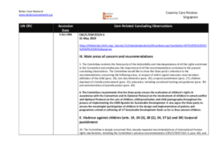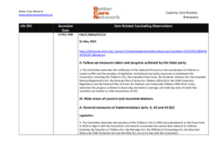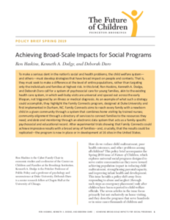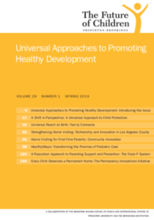Displaying 321 - 330 of 1759
This paper presents the current vulnerabilities faced by children and the scenario of child protection in India. While discussing the legal provisions prevailing in the country, it sheds light on the socio-cultural barriers that are creating resistance within the society in making the Alternative Care model (and the process of deinstitutionalisation of children) a success. Lastly it suggests viable options that may be helpful for the same.
This article from Marquette Law Review focuses on how children and parents interacting with the child welfare system in the US experience the removal process, the genesis of a foster care case.
This country care review includes the care-related Concluding Observations adopted by the Committee on the Rights of the Child.
This country care review includes the care-related Concluding Observations adopted by the Committee on the Rights of the Child.
This chapter from the boom Child Justice Administration in Africa examines the development of the child justice system in South Africa. The empirical findings in this book revealed the models put in place for alternative care of children in need of care and protection, which the author believes were hindered by inadequate budgetary allocations and could have been recorded in the administration of child justice in South Africa.
Given that research identifies parental experiences of shame and humiliation in the child protection process, this article reports on a qualitative study that investigated how and why parents experienced such emotions within the English system.
This article uses a content analysis methodology to critically examine and compare the findings of six recent Australian child protection inquiries (five at state and territory level and one Commonwealth) in relation to their discrete sections on leaving care.
In this brief, Ron Haskins, Kenneth A. Dodge, and Deborah Daro call for a system of psychosocial care for young families in the US, highlighting the the Family Connects program which aims to reach every family with a newborn child in a given community through a system that combines home visiting by trained nurses; community alignment through a directory of services to connect families to the resources they need; and data and monitoring through an electronic data system that acts as a family-specific psychosocial and educational record.
This volume explores universal social programs designed to serve entire communities as they move toward achieving population impact in reducing child maltreatment, strengthening parental capacity, and improving infant health and development.
This study tests whether an expansion of the Danish aftercare scheme in 2001 affects later outcomes of foster care alumni.




